
The United Nations Secretariat is one of the six principal organs of the United Nations (UN), The secretariat is the UN's executive arm. The secretariat has an important role in setting the agenda for the deliberative and decision-making bodies of the UN, and the implementation of the decision of these bodies. The secretary-general, who is appointed by the General Assembly, is the head of the secretariat.
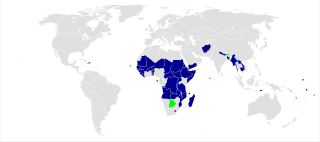
The least developed countries (LDCs) are developing countries listed by the United Nations that exhibit the lowest indicators of socioeconomic development. The concept of LDCs originated in the late 1960s and the first group of LDCs was listed by the UN in its resolution 2768 (XXVI) on 18 November 1971.
Anwarul Karim Chowdhury is a Bangladeshi diplomat most noted for his work on development in the poorest nations, global peace and championing the rights of women and children. In a speech he gave in 2005, Chowdhury stated: "We should not forget that when women are marginalized, there is little chance for an open and participatory society." In his role as the leading United Nations Culture of Peace emissary, he said in May 2010 that peace efforts would continually fail until people embraced humanity's oneness.

Ban Ki-moon is a South Korean politician and diplomat who served as the eighth secretary-general of the United Nations between 2007 and 2016. Prior to his appointment as secretary-general, Ban was the South Korean Minister of Foreign Affairs and Trade between 2004 and 2006. Ban was initially considered to be a long shot for the office of Secretary-General of the United Nations; he began to campaign for the office in February 2006. As the foreign minister of South Korea, he was able to travel to all the countries on the United Nations Security Council, a maneuver that subsequently turned him into the campaign's front runner.
The landlocked developing countries (LLDC) are developing countries that are landlocked. The economic and other disadvantages experienced by such countries makes the majority of landlocked countries the least developed countries (LDCs), with inhabitants of these countries occupying the bottom billion tier of the world's population in terms of poverty. Outside of Europe, there is not a single highly developed landlocked country as measured by the Human Development Index (HDI), and nine of the twelve countries with the lowest HDI scores are landlocked. Landlocked European countries are exceptions in terms of development outcomes due to their close integration with the regional European market. Landlocked countries that rely on transoceanic trade usually suffer a cost of trade that is double that of their maritime neighbours. Landlocked countries experience economic growth 6% less than non-landlocked countries, holding other variables constant.

Small Island Developing States (SIDS) are a group of developing countries that are small island countries and tend to share similar sustainable development challenges. These include small but growing populations, limited resources, remoteness, susceptibility to natural disasters, vulnerability to external shocks, excessive dependence on international trade, and fragile environments. Their growth and development are also held back by high communication, energy and transportation costs, irregular international transport volumes, disproportionately expensive public administration and infrastructure due to their small size, and little to no opportunity to create economies of scale. They consist of some of the most vulnerable countries to climate change.
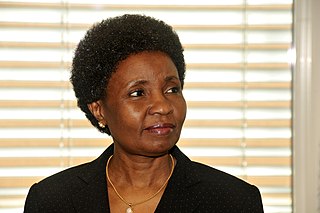
Asha-Rose Mtengeti Migiro is a Tanzanian politician and diplomat who was the Deputy Secretary-General of the United Nations from 2007 to 2012. She was appointed as the United Nations Secretary-General's Special Envoy for HIV/AIDS in Africa on 13 July 2012.

The United Nations Department of Economic and Social Affairs is part of the United Nations Secretariat and is responsible for the follow-up to major United Nations Summits and Conferences, as well as services to the United Nations Economic and Social Council and the Second and Third Committees of the United Nations General Assembly. UN DESA assists countries around the world in agenda-setting and decision-making with the goal of meeting their economic, social and environmental challenges. It supports international cooperation to promote sustainable development for all, having as a foundation the 2030 Agenda for Sustainable Development and the 17 Sustainable Development Goals (SDGs) as adopted by the UN General Assembly on 25 September 2015. In providing a broad range of analytical products, policy advice, and technical assistance, UN DESA effectively translates global commitments in the economic, social and environmental spheres into national policies and actions and continues to play a key role in monitoring progress towards internationally agreed-upon development goals. It is also a member of the United Nations Development Group.
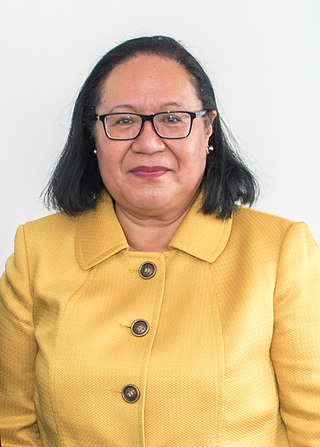
Fekitamoeloa Katoa ‘Utoikamanu is a Tongan civil servant, diplomat and Cabinet Minister currently serving as Tonga's Minister of Foreign Affairs. From 2005 to 2009 she was Tonga's permanent ambassador to the United Nations, and from 2017 to 2021 she was United Nations High Representative for the Least Developed Countries, Landlocked Developing Countries and Small Island Developing States.

Alhaji Dr. Kandeh Kolleh Yumkella is a Sierra Leonean agricultural economist, politician, and the former United Nations Under-Secretary-General and the Special Representative of the Secretary-General for Sustainable Energy for All. He was also the chief executive officer of the Sustainable Energy for All Initiative. Yumkella is a former Chairman of UN-Energy and a two-term former Director-General of the United Nations Industrial Development Organization (UNIDO).

Filippo Grandi is an Italian diplomat and United Nations official, currently serving as United Nations High Commissioner for Refugees. He previously served as Commissioner-General of the United Nations Relief and Works Agency for Palestine Refugees in the Near East (UNRWA) and United Nations Deputy Special Representative for Afghanistan.
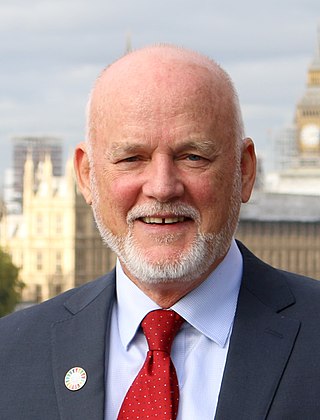
Peter Thomson is a Fijian diplomat and the United Nations Secretary-General's Special Envoy for the Ocean, and President of the United Nations General Assembly from September 2016 until September 2017. He served as Fiji's Permanent Representative to the United Nations February 2010 to August 2017, with concurrent duties as Fiji's Ambassador to Cuba.
LDC Watch is an alliance of organizations based in Least Developed Countries and other related organizations. Based in Belgium, it coordinates activities in the fields of trade, debt, foreign investment, human rights, governance and conflict resolution. LDC Watch undertakes lobbying, networking and advocacy with LDC governments and development agencies. Its aim is to implement a programme of action formulated at a UN Conference in Brussels in 2001, with the participation of civil society.
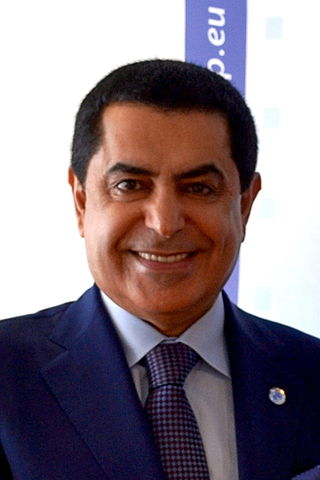
The Sixty-sixth Session of the United Nations General Assembly opened on 13 September 2011 at 15:00 and was presided over by former Qatari permanent representative to the UN Nassir Abdulaziz Al-Nasser. The session ended on 18 September as al-Nasser symbolically passed the gavel to the president of the next session, Vuk Jeremic.
Alounkeo Kittikhoun is a Laotian diplomat and statesman. He served as Minister to the Prime Minister's Office from 2016-2020 and Vice Minister for Foreign Affairs of Laos, and was the country's ASEAN Senior Officials Meetings (SOM) Leader. Prior to his Vice Ministerial role, Kittikhoun was Assistant Minister for Foreign Affairs (2007-2011). This position was preceded by his service as the Lao Ambassador and Permanent Representative to the United Nations in New York (1993-2007). Kittikhoun is noted for maintaining the longest length of service as a Lao diplomat, and is one of the longest-serving Ambassadors at the United Nations.
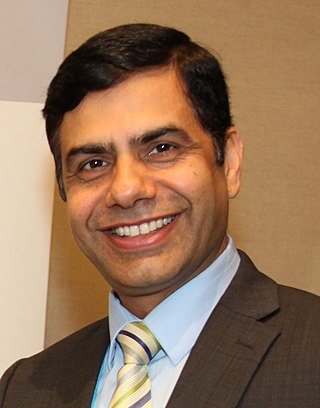
Gyan Chandra Acharya is the Nepali ambassador to the United Kingdom since January 2021, and the former United Nations Under-Secretary-General and High Representative for the Least Developed Countries, Landlocked Developing Countries and Small Island Developing States. He was appointed to this position by the UN Secretary-General Ban Ki-moon on 14 August 2012.

Django Sissoko was a Malian civil servant who was Prime Minister of Mali from December 2012 to September 2013. He was Minister of Justice from 1984 to 1988 and subsequently served twice as Secretary-General of the Presidency, from 1988 to 1991 and from 2008 to 2011. He also served as Ombudsman from 2011 to 2012.
The United Nations Office of the High Representative for the Least Developed Countries, Landlocked Developing Countries and Small Island Developing States (UN-OHRLLS) is an office of the United Nations Secretariat which deals with the Least Developed Countries, Landlocked Developing Countries, and Small Island Developing States. It was founded in 2001 by United Nations resolution 56/227.

The Post-2015 Development Agenda was a process from 2012 to 2015 led by the United Nations to define the future global development framework that would succeed the Millennium Development Goals. The new framework, starting from 2016 is called Sustainable Development Goals.
Abdul Kamara is the United Nations Joint Special Representative in Darfur.














